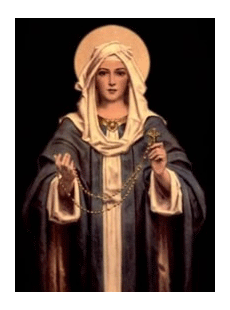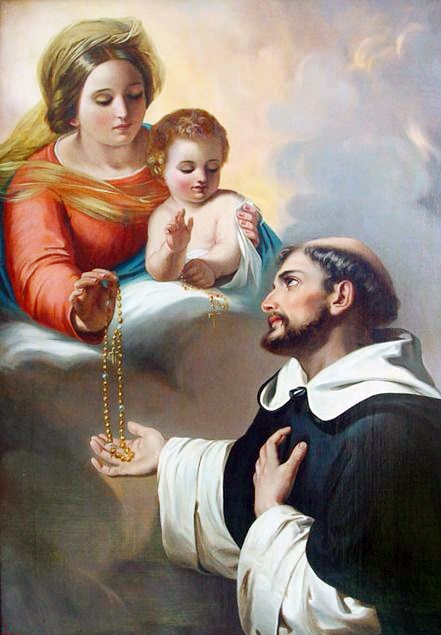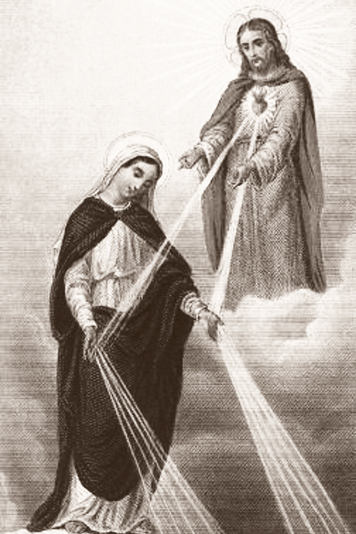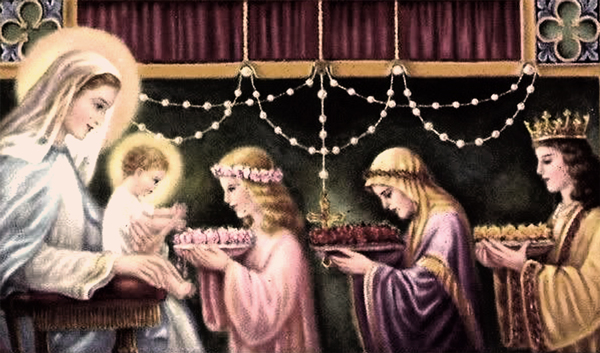The Rosary’s History

The rosary was originally called the Psalter of the Blessed Virgin Mary because Our Lady is venerated by the angelic greeting (the Hail Mary) repeated one hundred fifty times, corresponding to the number of the Davidic Psalter, and by the Lord’s Prayer before each decade. Superimposed on these prayers are certain meditations showing forth the entire life of Our Lord Jesus Christ, thus completing the method of prayer devised by the Fathers of the Holy Roman Church. In this we see that the rosary actually has its origin partly in the Divine Office, the official prayer of the Church, in which all 150 Psalms are recited/chanted in the course of each week.
The 150 Davidic Psalms (the Psalter of David) have always been prayed by Old Testament Israel, by post-Temple Jews, and by Christians for personal prayer, communal prayer, lamentations, praise, thanksgiving, and, in the case of Christians, to demonstrate the fulfillment of prophecy. They came to form a large part of the Divine Office sung at the various canonical hours by religious. Lay people who did not have copies of Scripture or the Breviary and lay people and religious who were illiterate would substitute 150 Pater Noster’s (Our Father’s) or Ave’s (Hail Mary’s) for the 150 Psalms they could not read.
The prayers were originally counted by transferring pebbles from one bag to another, but soon enough Christians began to tie a rope with knots on which to count. This evolved further into using beads or pieces of wood in place of the knots, and this soon came to be called the “Psalter of the Laity”. Around the end of the first millennium, rosaries contained the present five decades (sets of ten beads), with the Ave beads shaped like white lilies for the purity of the Virgin and the Pater beads shaped like red roses for the wounds and Passion of Christ.
 St. Dominic de Guzman popularized the Marian Psalter in the form we have it today (150 Aves with a Pater after each 10) when Our Lady encouraged him to pray it that way in response to the Albigensian heresy. So associated with the Rosary is St. Dominic that the Rosary is often called the “Dominican Rosary”.
St. Dominic de Guzman popularized the Marian Psalter in the form we have it today (150 Aves with a Pater after each 10) when Our Lady encouraged him to pray it that way in response to the Albigensian heresy. So associated with the Rosary is St. Dominic that the Rosary is often called the “Dominican Rosary”.
The Rosary, thus, has always been a weapon against heresy and trouble. In fact, the October 7, 1571 victory of Christendom over Islamic warriors at the Battle of Lepanto – the first naval victory against the infidels – was attributed directly to the rosaries prayed by the faithful.
The Essence of the Rosary
The popes tell us its essence is “to recall the mysteries of salvation in succession, while the subject of meditation is mingled and interlaced with the Angelic Salutation and prayer to God the Father.” Meditation on the mysteries of salvation is a short and easy method to nourish faith and to preserve it from ignorance and error. These mysteries of salvation are the key events in the lives of Jesus and Mary and the lessons and truths learned from them: faith in God, the future life, the forgiveness of sins, the mysteries of the August Trinity, the Incarnation of the Word, the Divine Maternity and others.
The 15 Mysteries of the Rosary
The five Joyful Mysteries (eternal life promised)
The Annunciation of the Angel Gabriel
The Visitation
The Nativity of Our Lord
The Presentation of Our Lord in the temple
The finding of Our Lord in the temple
The five Sorrowful Mysteries (eternal life won)
The Agony in the garden
The scourging at the pillar
The crowning with thorns
The carrying of the cross
The crucifixion
The five Glorious Mysteries (eternal life attained)
The Resurrection of Our Lord
The Ascension of Our Lord
The descent of the Holy Ghost upon the Apostles
The Assumption of the Blessed Virgin Mary into Heaven
The coronation of Our Lady
Spiritual Fruits
The rosary is presented both as a “school of faith” and a “school of charity.” Meditation on the mysteries of salvation is to lead to conversion of heart and change of conduct. Contemplation on the mysteries is essentially a loving act of gratitude through which the heart is “filled with love...hope enlarged, and the desire increased for those things which Christ has prepared for such as have united themselves to Him in imitation of His example and in participation in His sufferings.” Attentive consideration of the “precious memorials” of our Redeemer leads to “a heart on fire with gratitude to Him.”
The rosary, the popes teach, is also meant to influence society as a whole. Several papal encyclicals speak of the social consequences, or the effects on society, which meditation on the mysteries of the rosary could produce. The holy and powerful life of Jesus Christ is to be a real antidote and remedy for the errors afflicting society. Our Lord’s example and that of His Mother are brought before our mind’s eye to be our encouragement and the sure path through life’s joys and sorrows. We must recall the command of Our Lady at her apparitions, both at Lourdes and at Fatima, that we must pray the rosary for sinners.
All of the popes have earnestly desired that the Holy Rosary should be recited especially during the month of October with increased devotion and with the utmost possible zeal, both in the churches and in homes. They urge that the Christian people should be led by its recitation to understand the dignity, the power, and the excellence of the Holy Rosary.
For more information, read the excellent and comprehensive Holy Rosary article in the Catholic Encyclopedia, which offers a detailed history of this prayer in the Church. Upon request, we will include a leaflet on how to pray the rosary with any rosary order.
O my Jesus, forgive us our sins, save us from the fires of hell. Lead all souls to Heaven, especially those most in need of Thy mercy!
Fifteen Promises of Our Lady to Christians who Recite the Rosary
1.Whoever shall faithfully serve me by the recitation of the rosary shall receive signal graces.
2.I promise my special protection and the greatest graces to all those who shall recite the rosary.
3.The rosary shall be a powerful armor against hell; it will destroy vice, decrease sin and defeat heresies.
4.It will cause virtue and good works to flourish; it will obtain for souls the abundant mercy of God; it will withdraw the hearts of men from the love of the world and its vanities and will lift them to the desire of eternal things. Oh, that souls would sanctify themselves by this means!
5.The soul which recommends itself to me by the recitation of the rosary shall not perish.
6.Whoever shall recite the rosary devoutly, applying himself to the consideration of its sacred mysteries, shall never be conquered by misfortune. God will not chastise him in His justice, he shall not perish by an unprovided death; if he be just, he shall remain in the grace of God and become worthy of eternal life.
7.Whoever shall have a true devotion for the rosary shall not die without the sacraments of the Church.
8.Those who are faithful to recite the rosary shall have during their life and at their death the light of God and the plenitude of His graces; at the moment of death, they shall participate in the merits of the saints in paradise.
9.I shall deliver from purgatory those who have been devoted to the rosary.
10.The faithful children of the rosary shall merit a high degree of glory in heaven.
11.You shall obtain all you ask of me by the recitation of the rosary.
12.All those who propagate the holy rosary shall be aided by me in their necessities.
13.I have obtained from my Divine Son that all the advocates of the rosary shall have for intercessors the entire celestial court during their life and at the hour of death.
14.All who recite the rosary are my sons, and brothers of my only son Jesus Christ.
15.Devotion to my rosary is a great sign of predestination.
(Given to St. Dominic and Blessed Alan)

© 2008 Carmelite Monastery

